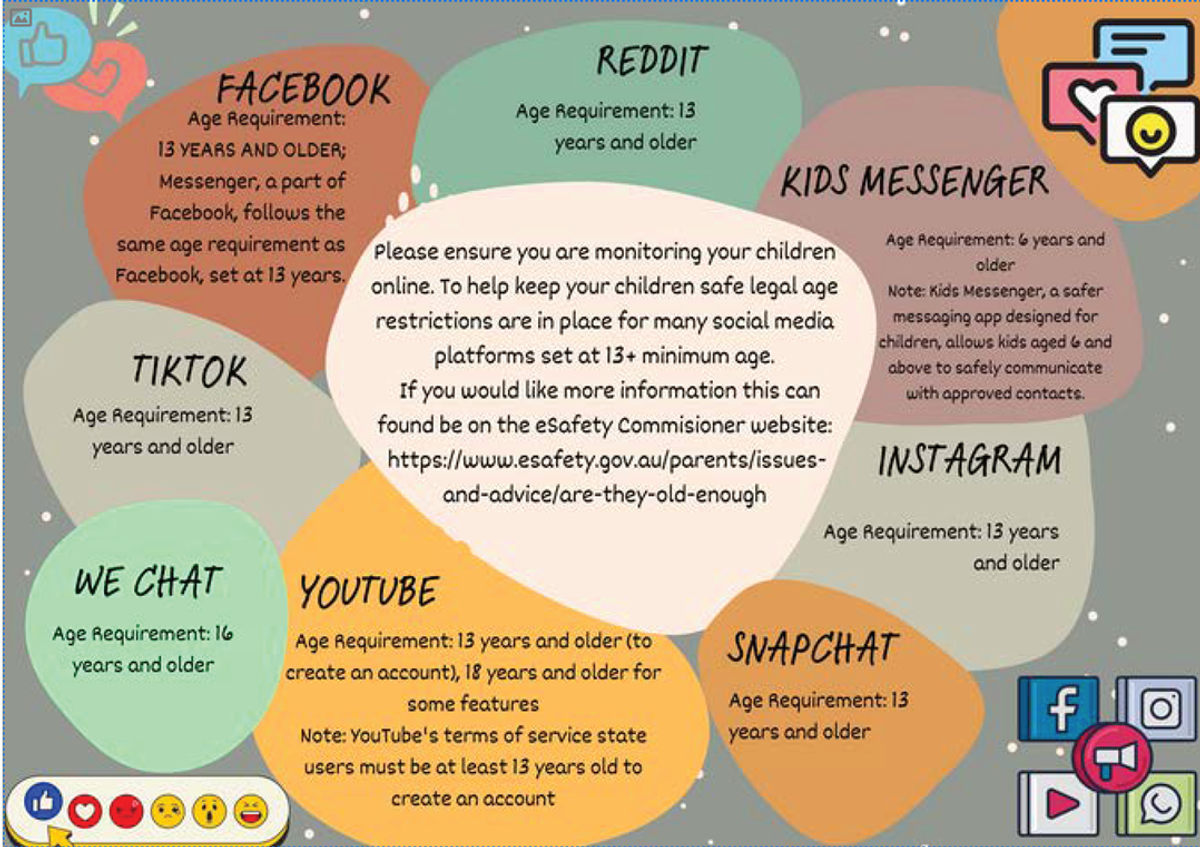With all the information in the news currently regarding social media and its impacts on children's wellbeing and mental health, I thought it timely to share information from the eSafety Commissioner to help you to reflect on your current practices with your child/ren and their access to particular apps.
As parents, we have a responsibility to support and protect our kids from the potential risks of social media while helping them to navigate the digital world safely and positively. Here are some key points and tips from the eSafety Commissioner to consider:
Social Media and Age Restrictions
In our digital era, social media platforms like Instagram, TikTok, Snapchat, and Facebook are central to the lives of many young people. These platforms offer opportunities for connection, creativity, and self-expression. However, they also present challenges that can affect mental and emotional well-being.
The eSafety Commissioner, Australia’s national independent regulator for online safety, provides critical guidance on managing these challenges and underscores the importance of adhering to age restrictions on social media.
Social media can offer several benefits:
- Connection and community: it allows young people to maintain relationships with friends and family, fostering a sense of belonging.
- Access to information and resources: platforms provide access to educational content, news, and resources that support academic and personal growth.
- Creative expression: social media offers outlets for young people to express themselves through various forms of art, enhancing their creativity.
The Impact of Social Media on Young People and the Importance of Age Restrictions
Challenges and Concerns
The eSafety Commissioner highlights several key concerns associated with social media use:
- Mental health: excessive social media use can lead to anxiety, depression, and feelings of loneliness. The pressure to present a perfect image and constant comparison with peers can result in low self-esteem and body image issues.
- Cyberbullying: the anonymity and distance of the internet can lead to cyberbullying, which can have severe emotional consequences for young people.
- Sleep disruption: using social media before bedtime can disrupt sleep patterns. The blue light emitted by screens can interfere with melatonin production, affecting sleep quality and overall health.
- Privacy risks: Sharing personal information online can expose young people to privacy risks, as they may not fully understand the long-term implications of oversharing or how to protect their digital footprint.
Importance of Age Restrictions
Most social media platforms have age restrictions designed to protect young users. These restrictions are critical for several reasons:
- Developmental appropriateness: Younger children may not have the emotional or cognitive maturity to navigate the complexities of social media, such as managing negative interactions or understanding privacy settings.
- Exposure to inappropriate content: Age restrictions help shield younger users from content that may be inappropriate or harmful, including violence, explicit material, and misinformation.
- Data privacy: younger users are more vulnerable to data privacy issues. Age restrictions help limit the exposure of personal data to potential misuse.
The eSafety Commissioner emphasises the importance of adhering to the following age restrictions:
Facebook and Instagram: Minimum age requirement of 13 TikTok: Minimum age requirement of 13, with additional privacy protections for users under 18 Snapchat: Minimum age requirement of 13 YouTube: Minimum age requirement of 13 for a personal account; YouTube Kids is available for younger children with parental supervision
- To ensure safe social media use among our young people, the eSafety Commissioner provides several recommendations.
- Open communication: have open discussions about social media use, encourage your child to share their online experiences and any negative encounters.
- Set boundaries: establish healthy screen time limits to ensure social media does not interfere with essential activities like sleep, study, and exercise.
- Critical thinking: teach young people to critically evaluate online content and understand the difference between online personas and reality to reduce the pressure of comparison.
- Promote positive use: encourage the use of social media for positive purposes, such as learning new skills, connecting with supportive communities, and engaging in meaningful conversations.
- Digital literacy education: incorporating digital literacy into the school curriculum equips students with skills needed to navigate the online world safely and responsibly. The eSafety Commissioner offers resources and programs that support this education.
Social media can be a powerful tool for connection and creativity when used responsibly. By understanding its potential impacts and adhering to age restrictions, young people can enjoy the benefits of social media while safeguarding their well-being.
The eSafety Commissioner's guidelines and resources are here to help young users navigate the digital landscape safely. For further resources and support, please visit the eSafety Commissioner’s website https://www.esafety.gov.au/


